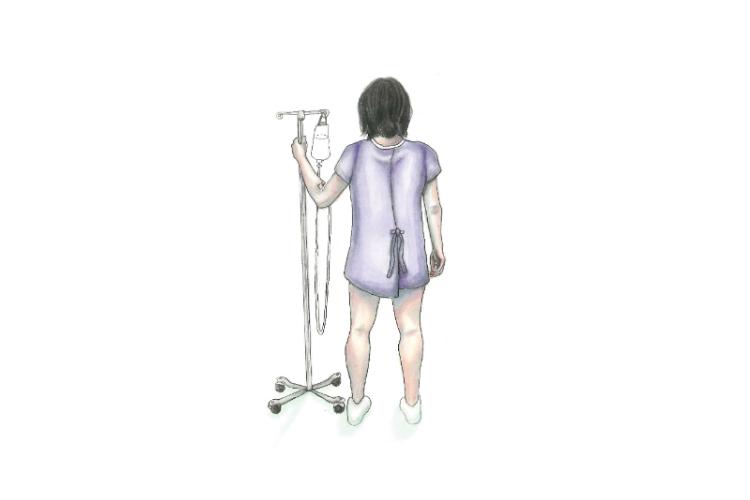
Isaac Sten silently walks onto the stage at Oregon Children’s Theatre. The lights are down, but the Grant senior can still hear the murmurs of the crowd. Sten settles into his place on stage amidst the piles of junk food wrappers, only an arm’s reach from the audience.
He opens a laptop and prepares for his first scene, running through the lines in his head as he receives his cue from backstage. The blinding lights begin to rise, reflecting off of his stage makeup.
Sten begins to type on his computer and slowly starts to emphasize his breathing, building the suspense. All of a sudden Sten jerks his left shoulder back, tensing his arm and shocking the audience, emulating the character’s anxiety through an anxious twitch.
Sten has always been fascinated by theater; he’s been performing in plays through both school and Oregon Children’s Theatre since he was a child. “I love theater because I want to make people feel things,” Sten says. “It feels good to step out of my own life momentarily.”
But beginning in high school, Sten started enduring severe chronic headaches. Soon after, he was diagnosed with bipolar disorder, a mental illness that causes severe mood swings.
When Sten was depressed, he felt hopeless. “I always wanted to act, but I would get to the point where I was like, ‘You know, I don’t think I can do this anymore,’” he says. “‘I don’t think that I’m good enough … I don’t think that I’ll be able to pursue (theater) as a future, so why try?’”
However, when Sten played a character who also dealt with mental illness, the connection helped him rekindle his passion for acting. “[Acting] gave me a purpose when I had no will to live.”
Sten was born on April 11, 2000. His parents, Matt and Andrea Sten, remember him being comfortable talking to anyone and constantly looking out for other people.
From a young age, theater intrigued Sten. “I think … the acting aspect of TV shows and movies kind of stood out to him,” Matt Sten says.
Isaac Sten would often sit in front of the glowing television with his family, enjoying the 1960’s version of Batman. While his parents and siblings would laugh playfully along to the show, Sten would pay attention to every detail carefully performed by the actors.
When Sten was eight, he asked his mom to sign him up for acting classes at Northwest Children’s Theater; he wanted to explore the interest he had developed from watching his favorite shows.
The classes at Northwest Children’s Theater taught only basic skills, but Sten quickly realized how much he loved acting.
In third grade, Sten performed in his first play: “Portland: The Musical,” at Alameda Elementary School. Dressed in a tie-dye shirt, bead necklaces, and sunglasses, Sten joyfully sang “Blowin’ in the Wind,” and ran around the stage holding a newspaper, announcing the bombing of Pearl Harbor. Sten was thrilled to be on stage for the first time.
After graduating from fifth grade, Sten realized that opportunities in theater at Beaumont – Alameda’s feeder middle school – would be limited. Not wanting to let go of his passion so soon, Sten begged his parents to apply for the lottery at da Vinci Arts Middle School, a school he knew put a lot of emphasis on the arts. Sten waited anxiously for a reply from the school and it finally came a couple months later: he had been accepted.
On his first day at da Vinci, Sten remembers feeling amazed. The art-covered hallways made the school more vibrant and colorful than Alameda had been. Even though Sten had expected a change in environment, he didn’t expect the comfort he felt when he walked in the doors of his new school. “da Vinci felt like this magical place to me where I felt at home,” Sten recalls.
While other students pursued painting or dance, Sten had his heart set on acting. At da Vinci, he performed in three plays: “King Lear,” “I Ain’t Got No Home” and “Check, Please.”
In preparation for “I Ain’t Got No Home,” Sten remembers spending hours backstage painting brand names and logos onto burlap sacks to add more detail to the play’s set. Specifics like these were overlooked in his plays at Alameda.
Sten felt as if he had found his niche and he was confident in his theatrical abilities heading into high school.
But during freshman year, Sten’s health started to decline.
It started with daily chronic headaches. Sometimes, the headaches would be so severe that Sten would hear a ringing sound in his ears, hindering his ability to think clearly.
Soon after it started, the ringing would be replaced by a “skull-crushing pain.” Sten remembers leaving class often, heading to the nearest hiding spot, somewhere where he would feel safe and in control of the environment – usually a secluded space where he was unlikely to be found.

Sten began getting fewer hours of sleep each night and his grades dropped rapidly. He reached out to his counselor for help and together they worked out a 504 Plan, a system that provides extra support for students struggling with medical issues. Sten used his 504 Plan to get extensions on classwork and homework.
Despite these struggles, Sten’s acting continued to progress. He performed in two more plays and made many new friends.
By the beginning of sophomore year, Sten began regularly encountering severe anxiety, depression and bipolar mood shifts. Doctors believe the lack of sleep and constant pain triggered the mental health issues.
During the low points, Sten turned to art and friends to help him out of the depression. However, it only continued to worsen. Looking for a new solution, Sten made the decision to go to a therapist. Starting in December of sophomore year, he visited a therapist one hour every week to discuss his struggles.
But in January and February, Sten hit rock bottom.
“Those were easily the worst months of my life,” he says. “I would just get home, go downstairs, put on a movie and just not function.”
During this period, Sten began to experience “mixed states” caused by his bipolar disorder, in which he would deal with a combination of mania and depression. “Mixed states are the worst because I’m depressed and suicidal,” Sten says. “There were a lot of times when I didn’t see myself having a future because I figured, ‘You know, if I’m gonna kill myself, what’s the point of trying … I’m not trying to go anywhere.’”
The closest Sten ever got to committing suicide was during a mixed state, but a phone call from his mom changed his mind.
Sten’s depression continued through mid-February when he started rehearsals with Oregon Children’s Theatre for his first professional play, titled “Chrysalis.” Sten played Nigel, a character who also struggled with anxiety and depression.
Playing a character who was fighting mental health issues – all the while combating his own depression – took its toll on Sten. He often lacked the energy necessary to display the character’s emotions during rehearsal and had to take naps on a couch in the lobby.
Soon, though, Sten found himself drawing parallels between the character’s emotions and his own. “Seeing how Nigel, my character, dealt with anxiety made me really think about how I dealt with it,” he says.
Because of this connection, “Chrysalis” became Sten’s purpose and it helped mitigate his struggles. “It was easily one of the most life changing experiences of my life, being in that play.”
Sten’s director, Matt Zrebski, says, “I think he began to have a lot of sympathy for that character, and I think he could reflect back on his own life as that character healed in the show.” Zrebski believes that this is one of the most therapeutic parts of acting.
With the end of “Chrysalis,” Sten’s motivation and energy returned. He says the production helped him by proving he could do what he loved; he remembers constantly pushing himself to reach new goals and succeed. The motivation enabled him to improve his grades as sophomore year wrapped up.

At the beginning of junior year, Sten and his therapist came up with a plan that had him getting six to seven hours of sleep a night. This additional rest boosted Sten’s energy and motivation to focus on his priorities.
Zrebski says he has noticed a change in Sten recently. “He looks better to me than he did when we were doing ‘Chrysalis,’” he says. “There seems to be less stress on his face and in his shoulders and in his body. He just seems more comfortable.”
Heading into senior year, Sten is thankful for what he has learned. “I learned so much about people through acting … their wants and fears, everything. I feel like every time I play a character I learn more and more.”
Sten is gearing up for his first real experience as a director, starting with a play he and his good friend are going to direct at ComedySportz, a theater often used for comedy improvisation. He also plans to direct the “One Acts” at Grant in the spring.
With his improvements, Sten has been able to find excellent medications, which have been very beneficial. “I can actually count on my fingers how many times I’ve been depressed since I started that medication a couple months ago, and that’s huge.”
Even though it has been over a year since “Chrysalis,” theater continues to be extremely favorable for Sten. “‘Chrysalis’ really helped me with my motivation, but each play that I’ve done since reinforces what I learned.”
The people closest to Sten believe that theater will be something he will be involved in for the rest of his life because of how important it was to his recovery. For Sten, this could mean a career in anything from acting to set design. He says he would enjoy any career in the drama department.
After high school, Sten believes he will attend either Portland State University or Southern Oregon University in Ashland because of the connection to the Oregon Shakespeare Festival.
Although Sten doesn’t know how far theater will carry him in life, he wants to continue to grow from it. “I learn about myself, I learn about others, it helps me deal with my problems and it teaches me life skills,” he says. “I just want to continue this.”


































